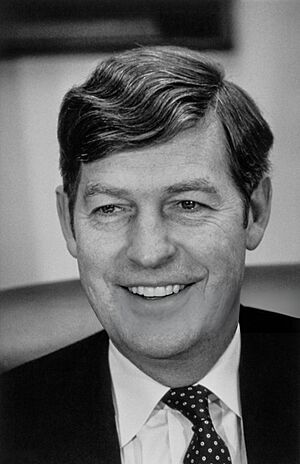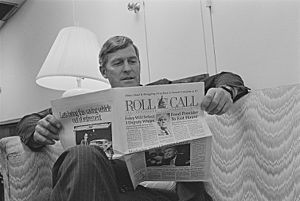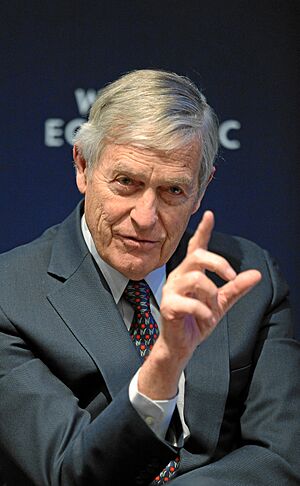Tim Wirth facts for kids
Quick facts for kids
Tim Wirth
|
|
|---|---|

Wirth in 1986
|
|
| Under Secretary of State for Democracy and Global Affairs | |
| In office May 12, 1994 – December 23, 1997 |
|
| President | Bill Clinton |
| Preceded by | Position established |
| Succeeded by | Frank E. Loy |
| 25th Counselor of the Department of State | |
| In office April 23, 1993 – April 30, 1994 |
|
| President | Bill Clinton |
| Preceded by | Robert Zoellick |
| Succeeded by | Wendy Sherman (1997) |
| United States Senator from Colorado |
|
| In office January 3, 1987 – January 3, 1993 |
|
| Preceded by | Gary Hart |
| Succeeded by | Ben Nighthorse Campbell |
| Member of the U.S. House of Representatives from Colorado's 2nd district |
|
| In office January 3, 1975 – January 3, 1987 |
|
| Preceded by | Donald Brotzman |
| Succeeded by | David Skaggs |
| Personal details | |
| Born |
Timothy Endicott Wirth
September 22, 1939 Santa Fe, New Mexico, U.S. |
| Political party | Democratic |
| Spouse | Wren Winslow |
| Relations | John Wirth (brother) Peter Wirth (nephew) |
| Children | 2 |
| Education | Harvard University (BA, MA) Stanford University (PhD) |
| Military service | |
| Allegiance | |
| Branch/service | |
| Years of service | 1961–1967 |
| Unit | United States Army Reserve |
Timothy "Tim" Endicott Wirth (born September 22, 1939) is an American politician from Colorado. He served as a Democrat in the United States Senate from 1987 to 1993. Before that, he was in the United States House of Representatives from 1975 to 1987. Tim Wirth also held important roles in the government. He worked in the Nixon Administration and later for the U.S. Department of State during the Clinton Administration. From 1998 to 2013, he was the president of the United Nations Foundation. He still serves on the Foundation's board today.
Contents
Early Life and Education
Tim Wirth went to Graland Country Day School in Denver and Phillips Exeter Academy. He earned his first degrees from Harvard University. Later, he received a PhD from Stanford University in 1973. He also served on the Harvard Board of Overseers.
Political Career
Wirth started his political journey as a White House Fellow under President Lyndon Johnson. This program helps young leaders learn about government. He also worked as Deputy Assistant Secretary for Education in the Nixon Administration. This role involved helping to shape education policies.
Serving in the House of Representatives
In 1974, Wirth returned to Colorado and successfully ran for the U.S. House of Representatives. He represented Boulder and the Denver suburbs from 1975 to 1987. As a new Congressman, Wirth helped lead a group of new members. They encouraged older committee leaders to be more open and fair. Wirth worked to bring more competition to the video and telephone industries. He also wrote the Indian Peaks Wilderness Act of 1978. This law helped protect natural areas.

Serving in the Senate
In 1986, Tim Wirth was elected to the U.S. Senate. He focused a lot on environmental issues, especially global climate change. He helped organize important hearings on climate change in 1988. During these hearings, a scientist named James Hansen explained that the Earth was getting warmer. He said this warming was mostly due to human activities. These hearings helped make climate change a public topic.
Wirth also worked with Senator John Heinz to create "Project 88." This project suggested a "Cap and Trade" idea. This idea later became part of the Clean Air Act Amendments of 1990. He also wrote the Colorado Wilderness Bill, which became law in 1993. With Senator Alan K. Simpson, he worked on laws to help stabilize population growth. Wirth decided not to run for re-election in 1992. He felt that too much money in politics was taking away from focusing on important public policies.
After Congress: Global Affairs and the UN Foundation
After leaving Congress, Wirth co-chaired the Clinton–Gore presidential campaign. From 1993 to 1997, he served in the U.S. Department of State. He was the first Undersecretary for Global Affairs. In this role, he led U.S. foreign policy on topics like refugees, population, environment, science, and human rights. He was the lead U.S. negotiator for the Kyoto Climate Conference.
In 1997, Wirth became the President of the United Nations Foundation (UNF). He led the Foundation from 1998 to 2013. The UN Foundation works to support the United Nations. It focuses on areas like the environment, women's health, children's health, and peace. The Foundation works with many partners to help solve big problems around the world.
Key Initiatives with the UN Foundation
- Helping to get rid of polio worldwide with groups like Rotary International.
- Starting a global effort to reduce the impact of measles.
- Creating a program called "Nothing But Nets" to buy anti-malaria bed nets.
- Supporting the special needs of teenage girls with partners like Nike.
- Working to increase U.S. funding for the United Nations Population Fund.
- Developing ways to manage tourism's impact on the environment.
- Leading efforts for future climate negotiations after the Kyoto Protocol.
- Working with farmers and UN agencies to understand bioenergy.
- Promoting energy efficiency standards in the U.S. and other countries.

The University of Colorado at Denver has a special position called the Tim Wirth Chair in Environmental and Community Development Policy. The person who holds this position is Gary Hart, who Wirth replaced in the Senate.
In his retirement, Wirth has supported the youth climate justice movement. He has worked to convince his old university, Harvard University, to stop investing in fossil fuels. In 2021, Harvard agreed to stop these investments.
Personal Life
Tim Wirth is married to Wren Winslow Wirth. They have two children, Chris and Kelsey Wirth. Their daughter, Kelsey, helped start a company called Align Technology. Their son, Chris, founded Liberty Puzzles, a jigsaw puzzle company. Tim Wirth's nephew, Peter Wirth, is a politician in New Mexico. His brother, John Wirth, was a history professor at Stanford University.
See also
- Atari Democrat
 | Selma Burke |
 | Pauline Powell Burns |
 | Frederick J. Brown |
 | Robert Blackburn |

